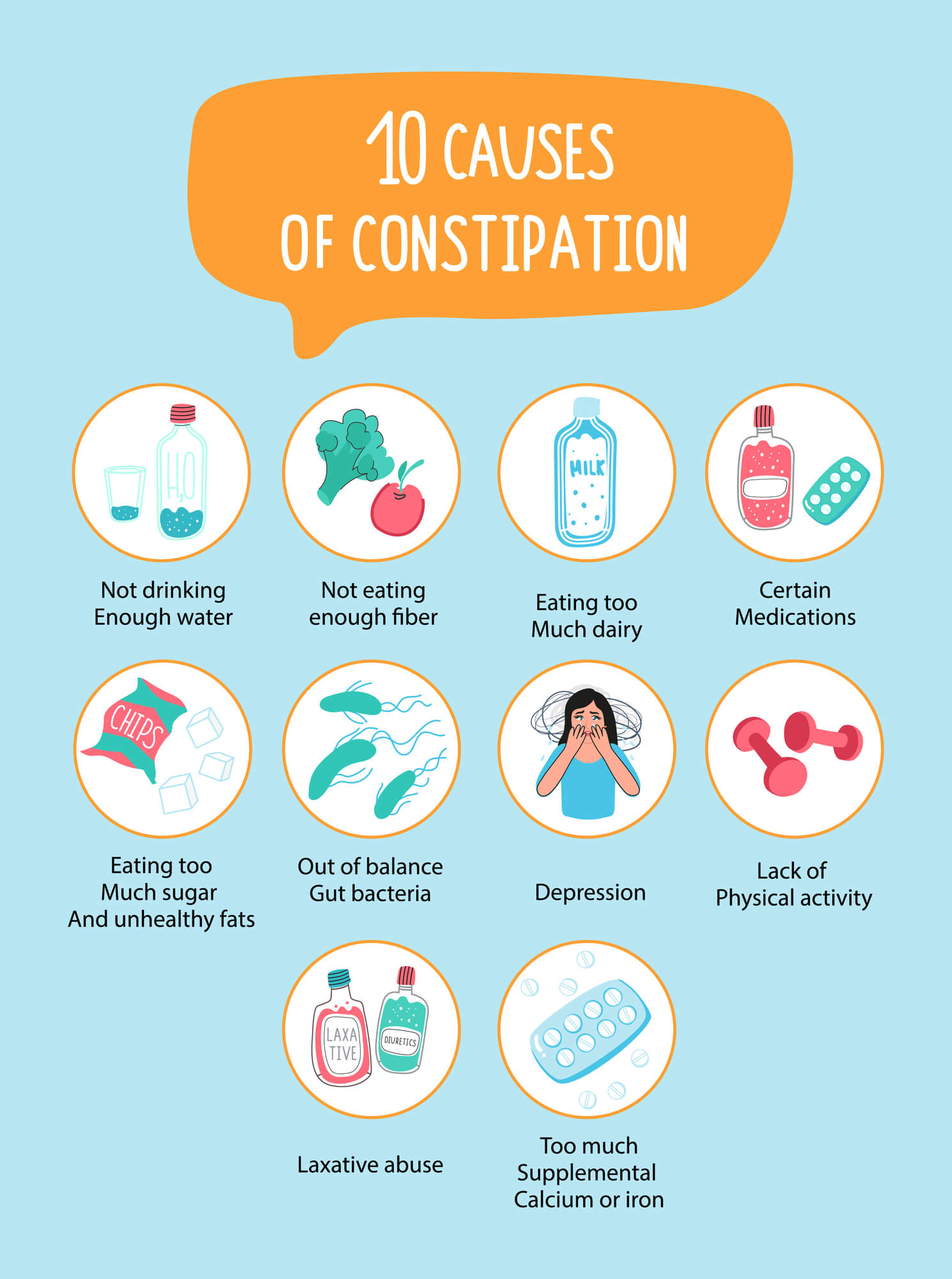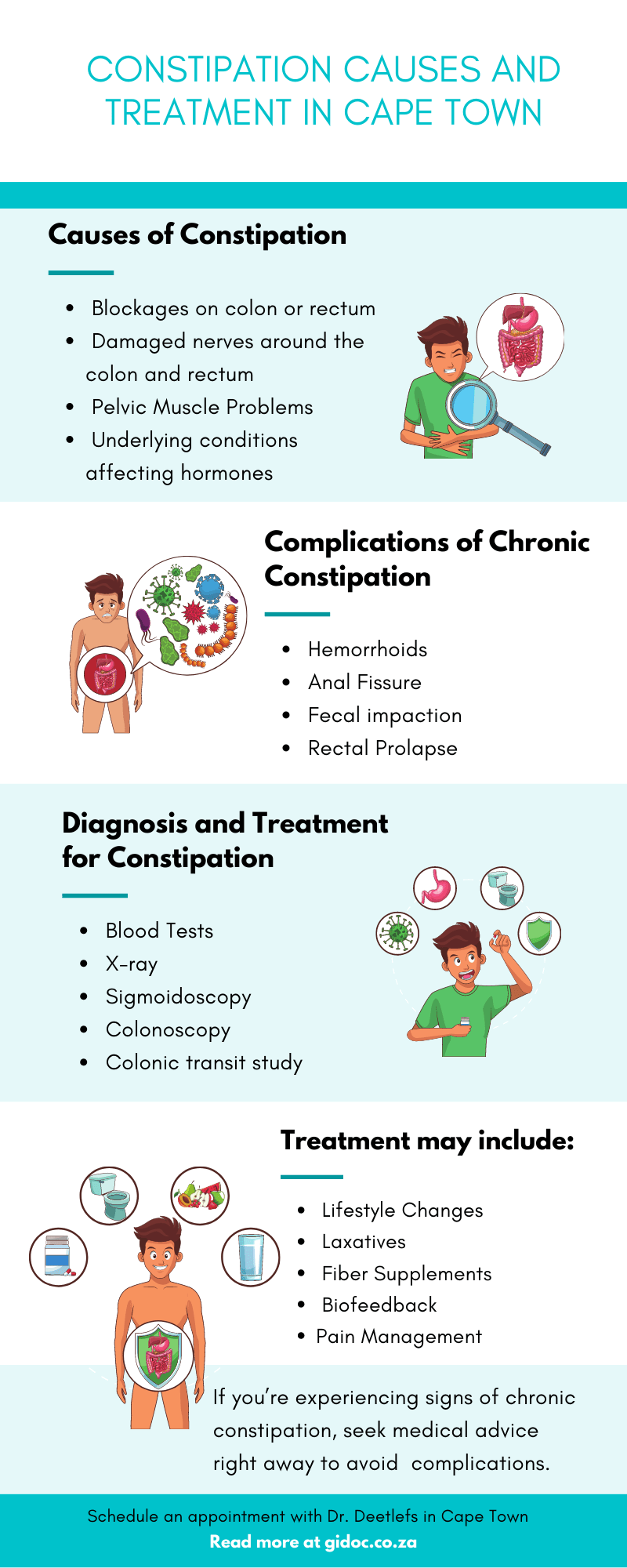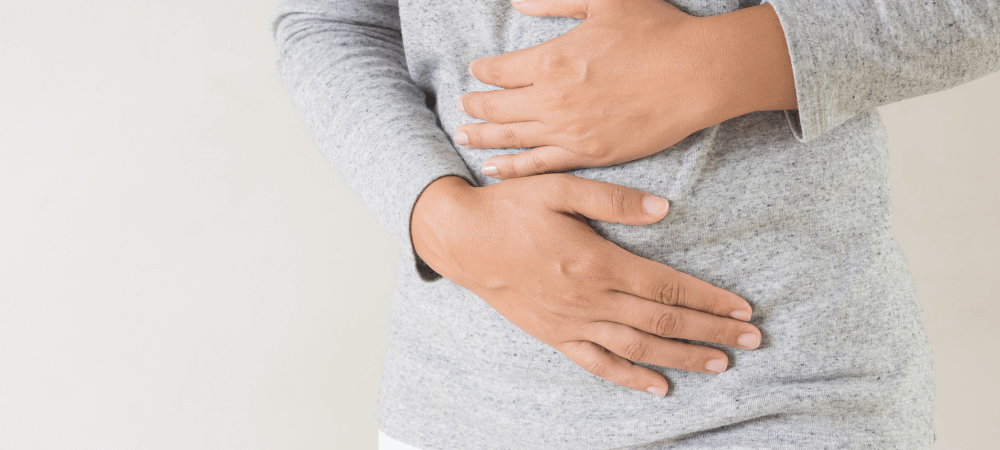Have you ever gone for days without feeling a need to go to the toilet?
While some would think that’s normal, most of the time it’s not.
Although there is no generally accepted number of times a person should have bowel movements, there will be times when you’ll notice that you’re visiting the toilet less often than usual.
When you do go to the toilet, it takes all of your strength to pass hard, dry stools.
These are signs of constipation or the condition of having infrequent bowel movements or difficulty in passing stools.
Let’s talk about constipation, what it is, what causes it, and how it can be treated, as well as when you should take it seriously.

How the Bowel Works
To understand why constipation happens, let us first see the normal process of passing stools from the digestive system.
Food travels to the digestive system and is pushed through the intestines which usually takes between 24 to 72 hours.
From the small intestines, where most of the absorption of nutrients takes place, stool consisting of ingested food, bile, and digestive juices is pushed to the large intestines (colon).
The large intestine (colon) is split into four (4) sections: (1) ascending, (2) transverse, (3) descending, and, (4) sigmoid colon. which connects to the rectum and anus.
Food stays within a section for a while, just enough for the digestive tract to absorb fluids and nutrients or process and expel waste.
One of the large intestine’s functions is to absorb most of the fluid that the stool contains to transform it from liquid to solid. The longer this process takes, the more reabsorption occurs, resulting in an increasingly solid stool.
A final bout of reabsorption occurs once the stool reaches the sigmoid colon, before entering the rectum.
The rectal walls will then be distended, signaling the internal anal sphincter to relax. This is the point where the body decides whether to physically expel or hold the stool.
Expelling or retaining the stool in the rectum is controlled by the pelvic floor muscles particularly the puborectalis and external anal sphincter.
The puborectalis forms a single-like formation around the rectum, called the anorectal angle. When you voluntarily relax your external anal sphincter, the stool is finally expelled.
The whole process is coordinated to the brain and is communicated through the sensory nerve pathways that communicate signals such as pain or fullness.
These nerves can also tell the brain if the rectum is filled with gas or stool, which is why you can consciously decide whether to hold or expel it.
Why Constipation Occurs
When you are constipated, a desire to visit the toilet is not enough to signal your body into action, making the whole process of expelling waste more tedious.
This problem usually arises due to two reasons:
- The stool’s excessively slow movement through the colon, causing over-absorption of liquid that makes the stool too dry and too hard.
- Tightening of the pelvic floor muscles due to pelvic floor dysfunction, aging, or childbirth.
Both problems make the anorectal angle more acute, making it too difficult to expel waste.

What is Chronic Constipation?
Going a day without a bowel movement is not necessarily a cause for alarm.
Generally, constipation becomes chronic when you defecate less than three times per week for several months.
Chronic constipation interferes with people’s ability to go about their daily tasks and can cause excessive straining and extreme discomfort during bowel movements.
Signs and symptoms of chronic constipation include:
- Bowel movement that occurs less than three (3) times per week
- Consistent passing of lumpy hard stools
- Continuous straining to have bowel movements
- Feeling of blockage in the rectum
- Feeling as though you cannot empty the rectum
- Needing help to empty the rectum by pressing the abdomen or using the finger to remove stool from the rectum.
If you have experienced two or more of these symptoms for the last two or three months, constipation may be considered chronic. It’s best to book an appointment with your Gastroenterologist right away.

Causes of Constipation
Chronic constipation has many possible causes:
1. Blockages in the colon or rectum
A blockage in the colon or rectum can slow down or completely stop stool movement.
Blockages may be caused either by anal fissures or tiny tears in the skin around the anus, bowel obstruction in the intestines, colon or rectal cancer and other abdominal cancers that presses on the colon, bowel stricture or narrowing of the colon, rectocele or a rectum bulge through the back wall of the vagina.
2. Damaged nerves around the colon and rectum
Since nerves have a vital role in the transmission of stool, it’s natural for neurological problems to cause issues with bowel movements.
Autonomic neuropathy or damaged nerves, multiple sclerosis, Parkinson’s disease, spinal cord injury, and stroke are some of the conditions that bring about chronic constipation.
3. Pelvic muscle problems
Weakened pelvic muscles that are unable to relax or contract correctly can cause chronic constipation.
4. Underlying conditions affecting hormones
Underlying conditions affecting hormones such as diabetes, overactive thyroid (hyperthyroidism), underactive thyroid gland (hypothyroidism), and pregnancy may cause a prolonged bowel movement.
Aging, pregnancy, dehydration, low-fiber diet, sedentary lifestyle, medications (e.g., sedatives, pain relievers, anti-depressants, blood pressure control), and some mental health conditions (e.g., eating disorder, depression) can increase one’s risk of developing chronic constipation.
Complications of Chronic Constipation
If chronic constipation remains untreated, the patient may develop the following complications:
1. Hemorrhoids – These are swollen veins in the anus that are caused by continuous straining to have a bowel movement. Hemorrhoid pain can be sudden and severe. The patient might feel or see a lump around the anus.
2. Anal fissure – This is a torn skin in your anus that is caused by a large or hard stool.
3. Fecal impaction – This is the accumulation of hardened stool that gets stuck in the intestines and cannot be expelled.
This is a very serious condition and needs medical attention right away. Fecal impaction won’t go away on its own. You need to have it removed for you to get better.
4. Rectal prolapse – This occurs when the intestine starts protruding from the anus due to continuous straining. Surgery is needed to repair the prolapse.
Diagnosis and Treatment for Constipation
in Cape Town
Treating constipation starts with diagnosing and trying to find the cause. Several tests can be made including the following:
- Blood tests – Your doctor will watch for systemic conditions such as hypothyroidism or high calcium levels.
- X-ray – This will show if your intestines are blocked and if there is stool present throughout the colon.
- Sigmoidoscopy – Examination of the rectum and lower, or sigmoid, colon
- Colonoscopy – Examination of the rectum and entire colon
- Colonic transit study – You may be asked to swallow a capsule with a wireless recording device or radiopaque marker. The progress of the capsule through your colon will be recorded for 24 to 48 hours and will be shown on X-rays.

Once the underlying cause is determined, your Gastroenterologist will recommend an appropriate treatment plan. Treatment may include:
1. Lifestyle changes: The doctor may recommend simple lifestyle changes such as stress management, daily exercise, and quitting smoking.
2. Laxatives: These are drugs that trigger muscle contractions in the small intestines to help advance bowel movement.
3. Fiber supplements: If the patient is found lacking in fiber, fiber supplements may be helpful to aid in digestion and defecation.
4. Biofeedback: Assessment and measurement of muscle tension in the rectum to teach physical techniques that improve pelvic muscle performance so the patient can pass stool more easily.
5. Pain management: This focuses on relieving the pain associated with chronic constipation.
6. Surgery: Some cases may need surgery, especially if there are structural issues in the small intestines such as rectocele.
If you’re experiencing signs of chronic constipation, seek medical advice right away to avoid complications.
Schedule an appointment with Dr. Deetlefs in Cape Town, South Africa to get prompt medical assistance for chronic constipation and other issues with your digestive health.
DISCLAIMER: PLEASE READ CAREFULLY
The information on this website is to provide general guidance. In no way does any of the information provided reflect definitive medical advice and self-diagnoses should not be made based on information obtained online. It is important to consult a Gastroenterologist or medical doctor regarding ANY and ALL symptoms or signs including, but not limited to: abdominal pain, haemorrhoids or anal / rectal bleeding as it may a sign of a serious illness or condition. A thorough consultation and examination should ALWAYS be performed for an accurate diagnosis and treatment plan. Be sure to call a physician or call our office today and schedule a consultation.
© Dr. Eduan Deetlefs, Registered Gastroenterologist, GI Doc Cape Town
Our website information is not intended or implied to be a substitute for professional medical advice, diagnosis or treatment. Please consult a doctor about your specific condition. Only a trained physician can determine an accurate diagnosis and proper treatment.


